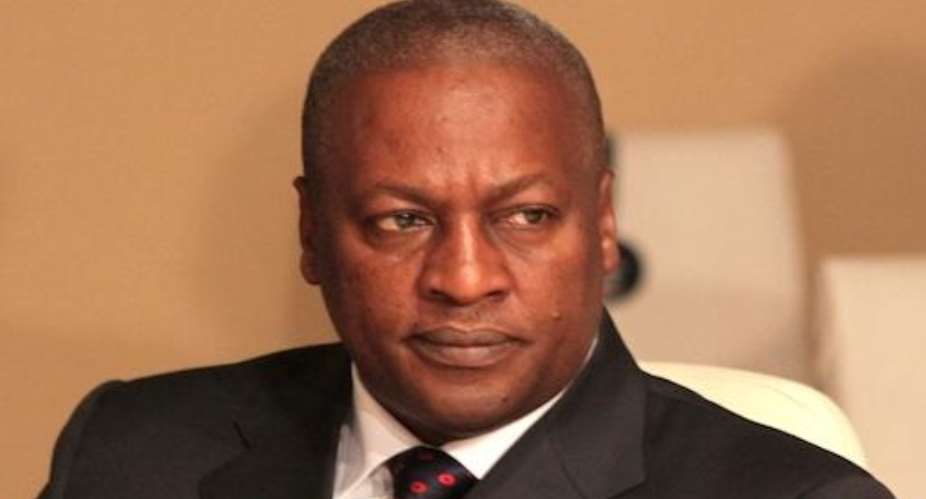Accra, May 8, GNA - President John Dramani Mahama on Friday tasked the Public Services Commission (PSC) and other relevant stakeholders to step up supervision in the public sector, to maximize production and performance.
In doing this, he said, managements of Ministries, Departments and Agencies needed to work hard to eliminate lateness, absenteeism, and other negative practices that hampered progress.
President Mahama said this when he addressed the second National Forum on Single Spine Policy (SSPP) in Takoradi in the Western Region, on the theme: "Sustaining the Single Spine Pay Policy".
The Forum, which was organised by the Ministries of Employment and Labour Relations, and Finance and Economic Planning, was a sequel to the previous one organized a year ago in Ho.
In attendance were the Ghana Employers Association, Fair Wages and Salaries Commission, Parliament, Civil Society Organizations, and other relevant stakeholders.
President Mahama urged managements to also introduce sanctions for those not performing, and rewards for workers, who distinguished themselves in their areas of endeavour.
He said the leadership of public sector organisations were not lifetime jobs and they should, therefore, not hesitate to fire non-performing workers in the MDAs.
President Mahama said government had also embarked on an exercise to eliminate ghost names on government payrolls, and called all stakeholders to play their roles responsible to achieve that aspiration.
The President said government would prosecute all public officials engaged in the creation of ghost names in the public payroll.
Vice President Paa Kwesi Amissah-Arthur, who chaired the forum, said they would also clarify issues of rationalization entailed in the agreement with the International Monetary Fund.
He said for some time now, the word 'rationalization' had gained prominence in Ghanaian media, suggesting that government would carry out job-cuts, and therefore needed more attention to educate the public on.
Vice President Amissah-Arthur said the deliberations at the forum would also focus on bottlenecks that had stifled the implementation of the SSPP, and make recommendations for their betterment.
Mr Haruna Iddrisu, Minister of Employment and Labour Relations, said stakeholders would begin negotiations on the national minimum wage on June 23, and would by the close of September, conclude and come to a consensus before the presentation of the next National Budget.
He said much as government was doing everything possible to eliminate ghost names and other fraudulent practices on the government payroll, there was the need to intensify negotiations with all stakeholders to avoid their recurrence, and periodic industrial actions.
Mr Iddrisu said the forum would therefore strike a balance between the grievances of workers and government implementation bodies, and to ensure that labour was rewarded for hard work in subsequent years.
The forum would among other things review the implementation of the SSPP with special focus on the recommendations from the Ho forum, and agree on the strategies for the implementation of the second phase, with focus on linking pay to productivity in the public sector.
The key areas to be considered for discussion include: sustainability of the SSPP, implementation of market premium, freedom of association and collective bargaining.
The others are managing pay-related industrial disputes, equity in public sector pay, implementation of categories two and three allowances and weaning subverted agencies off government payroll.
GNA





 Minority will expose the beneficial owners of SML, recover funds paid to company...
Minority will expose the beneficial owners of SML, recover funds paid to company...
 Prof. Opoku-Agyemang has ‘decapitated’ the NPP’s strategies; don’t take them ser...
Prof. Opoku-Agyemang has ‘decapitated’ the NPP’s strategies; don’t take them ser...
 Abubakar Tahiru: Ghanaian environmental activist sets world record by hugging 1,...
Abubakar Tahiru: Ghanaian environmental activist sets world record by hugging 1,...
 Prof. Naana Opoku-Agyemang will serve you with dignity, courage, and integrity a...
Prof. Naana Opoku-Agyemang will serve you with dignity, courage, and integrity a...
 Rectify salary anomalies to reduce tension and possible strike action in public ...
Rectify salary anomalies to reduce tension and possible strike action in public ...
 Stop all projects and fix ‘dumsor’ — Professor Charles Marfo to Akufo-Addo
Stop all projects and fix ‘dumsor’ — Professor Charles Marfo to Akufo-Addo
 Blue and white painted schools will attract dirt shortly – Kofi Asare
Blue and white painted schools will attract dirt shortly – Kofi Asare
 I endorse cost-sharing for free SHS, we should prioritise to know who can pay - ...
I endorse cost-sharing for free SHS, we should prioritise to know who can pay - ...
 See the four arsonists who petrol-bombed Labone-based CMG
See the four arsonists who petrol-bombed Labone-based CMG
 Mahama coming back because Akufo-Addo has failed, he hasn't performed more than ...
Mahama coming back because Akufo-Addo has failed, he hasn't performed more than ...
